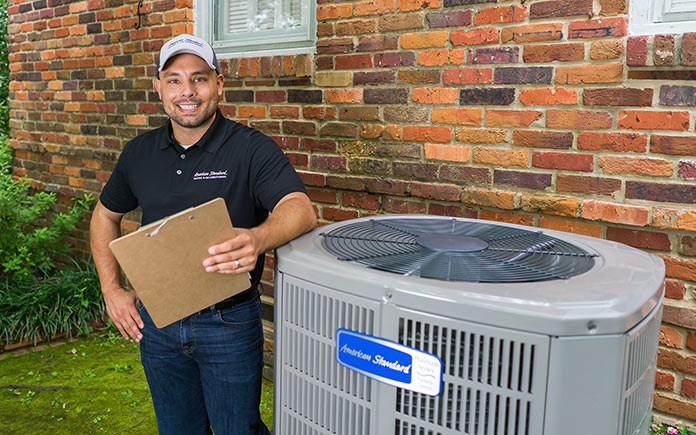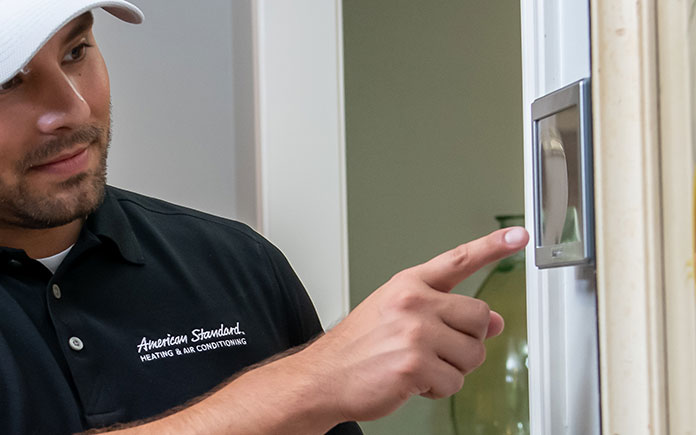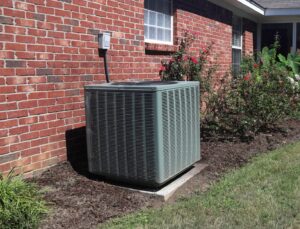How to Lengthen the Life of Your Heating and Cooling System

Your air conditioner and furnace are two of the most expensive systems in your home, which is why you should do everything you can to take care of them. Regular maintenance and tune-ups are important — so is changing your HVAC filter at the correct intervals. Still, there are several other tasks you can do to make your HVAC system last as long as possible.
Here are some tips that will allow you to increase the life span of your heating and cooling system.
1. Get Annual Tune-Ups
You need to call a heating, ventilation, and air conditioning professional and get HVAC tune-ups twice a year (once for heating and once for cooling).
Get your furnace checked just before its winter use and your air conditioning unit checked just before the hot months of summertime.
Your tune-up professional will lubricate and inspect all system parts for functionality during the checkup.

They’ll replace air filters, clean out drain holes and check your refrigerant levels. These maintenance visits will ensure that your system is running optimally, and that it will work when you need it most to stay comfortable in your home.
2. Change the Heating and Cooling System’s Filters
Your heating and cooling system has filters that require changing or cleaning every so often. The job of these filters is to trap harmful debris and allergens throughout your ventilation system. It’s a good idea to change these filters every 90 days, at least, so that your system works efficiently and to prevent system failure.
If you don’t change your filters, they will become clogged and lead to poor indoor air quality. This will make it difficult for the heating and cooling system to push air through your ventilation pipes.
If you don’t change your filters, they will become clogged. This will make it difficult for the heating and cooling system to push air through your ventilation pipes.
Watch and Learn: How to Change an Air Conditioner Filter
3. Use a Programmable Thermostat
When you use your heating and cooling system less, it lasts longer. With a programmable thermostat, you can strategically use your system so that it only runs when you need it. For example, with a programmable thermostat, you can set it to start heating or cooling your home to a more comfortable level about a half-hour before you get home in the evening.
This way, you can save on energy costs and heating and cooling running time during the daytime hours when no one is home.

Better yet, a Wi-Fi-connected smart thermostat can monitor your patterns and suggest efficiencies, saving you even more money.
Watch and Learn: How to Install a Programmable Thermostat
4. Use the ‘Auto’ Setting
Your heating and cooling system has various settings. The most common ones are the ‘auto’ and ‘on’ positions.
You should always run your system on the ‘auto’ setting. This means that the fan will only blow when the system needs it to do so to reach the desired temperature.
When you set your system to the ‘on’ position, the fan will run around the clock regardless of the set temperature.
Extending the life of your heating and cooling unit is all about caring for its components and limiting unnecessary use.
When you run your heating and cooling system only when you need it, you can count on it lasting longer than the manufacturer suggests.
5. Check for Leaks
Regularly inspect your ductwork for leaks, as these can cause your system to work harder than necessary to maintain the desired temperature.
Seal any leaks you find with mastic sealant or foil-backed tape (i.e., actual “duct” tape) to improve efficiency and extend the life of your system.
6. Shade Your Outdoor Unit
Planting trees or installing awnings to shade your outdoor unit during most of the day can help it run more efficiently, especially during the hottest months of the year.
This reduces strain on the system and can contribute to a longer life span.
7. Keep Your Outdoor Unit Clean
Debris, such as leaves and grass clippings, can bunch up around your outdoor unit and reduce its efficiency.
Regularly clean the area around the unit and remove any debris to ensure proper airflow and prevent overworking the system.

8. Clean Your Ducts
Over time, dust and debris will build up in your ductwork — this reduces airflow over time and forces your system to work harder. Have your ducts professionally cleaned every few years to maintain efficiency and extend the life of your heating and cooling system.
9. Vacuum Regularly
Vacuuming your home several times per week helps reduce the amount of dust and debris that can clog your filters and strain your system.
This simple task can contribute to a longer-lasting heating and cooling system.
10. Don’t Block Vents
Make sure you’re not blocking your vents with furniture, curtains, or other objects. Obstructed vents can cause your system to work harder than necessary, leading to increased wear and tear and a shorter life span.
11. Draw Blinds and Curtains
During the hottest parts of the day, close your blinds and curtains to prevent solar heat gain.
This reduces the workload on your cooling system, helping it last longer.
12. Upgrade Your Home’s Insulation
Higher R-value insulation helps maintain a consistent temperature in your home, taking a load off both your heating and cooling systems.
When you upgrade your home’s insulation, you can improve the efficiency and extend the life of your AC unit.
Final Thoughts
The key to extending the life of your HVAC system is regular HVAC maintenance and strategic steps that any homeowner can do.. By scheduling annual tune-ups, changing filters regularly, using a programmable thermostat, and running your system on the ‘auto’ setting, you can ensure that your system operates efficiently and lasts longer than the manufacturer’s suggested life span and prevent breakdowns.
Additionally, checking for leaks, shading and cleaning your outdoor unit, cleaning your ducts, vacuuming regularly, keeping vents unobstructed, drawing blinds and curtains, and upgrading your home’s insulation can all contribute to a longer-lasting, more effective heating and cooling system.
Further Reading on Heating and Cooling Systems
Frequently Asked Questions
How often should I schedule tune-ups for my HVAC system?
I (and most HVAC technicians) recommend tune-ups twice a year — once for heating just before winter and once for cooling before summer.
Can I clean my ducts myself, or should I hire a professional?
You can clean your vents and registers yourself, but you won’t have the proper tools to reach far enough into the ductwork. So, it’s best to hire a professional duct cleaning company for the best results.
How long does a typical heating and cooling system last?
HVAC systems typically lasts 15-20 years when you do routine maintenance. However, it varies depending on your climate zone, usage, and your specific brand.
Article Update Log






Leave a Reply